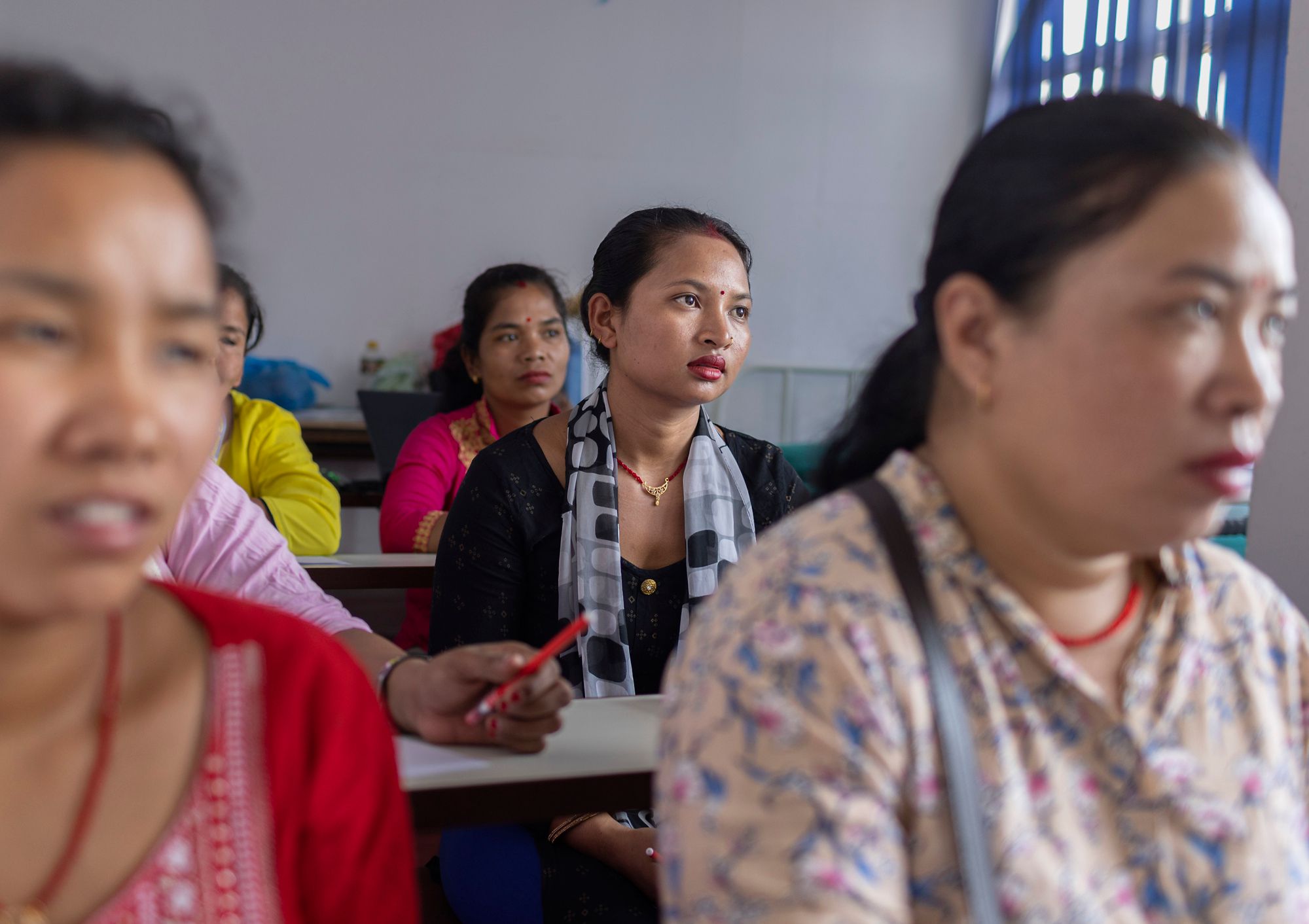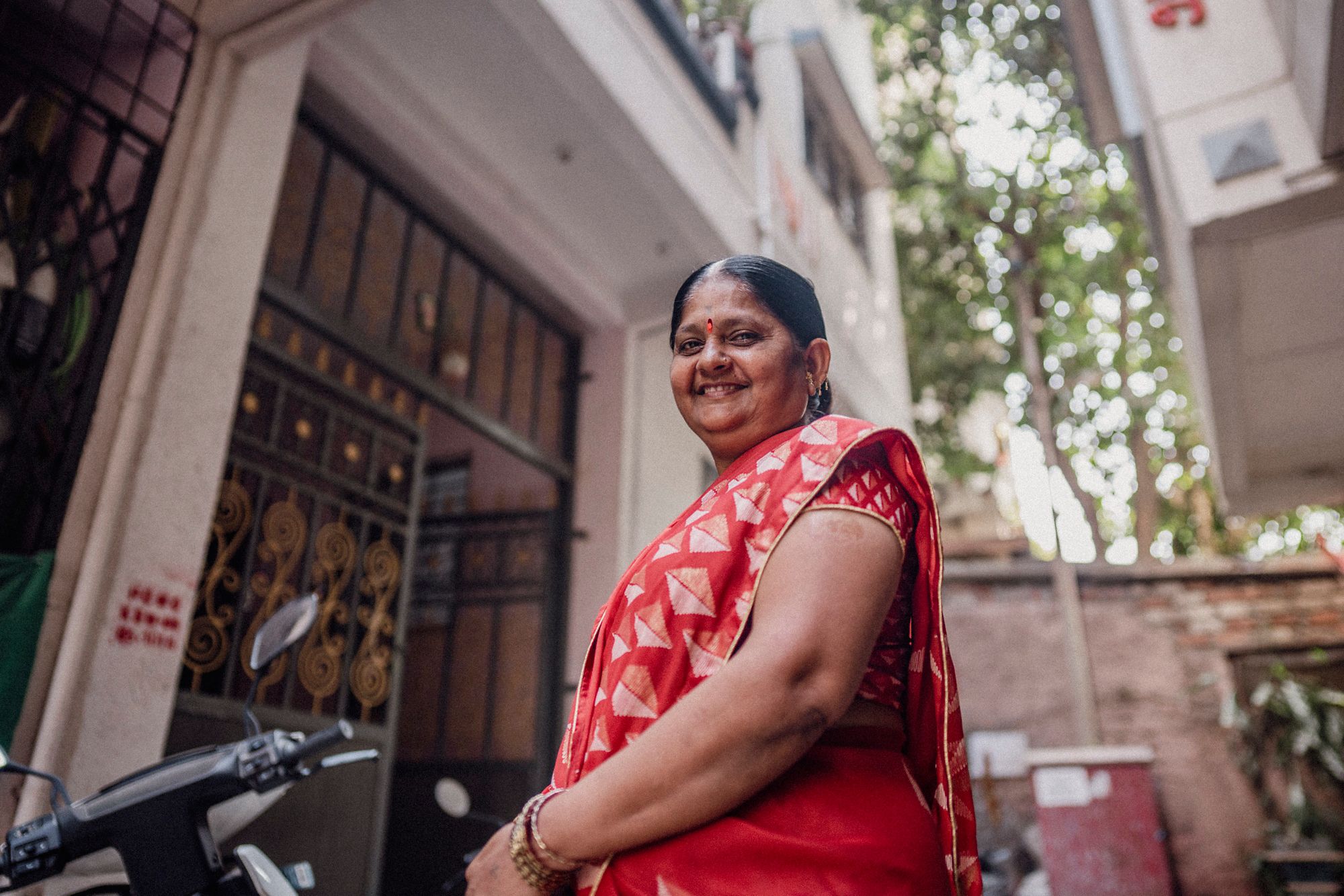At a Glance
- SMEs are the backbone of Nepal’s economy—they generate 22 percent of GDP and employ almost two million people. Yet for 44 percent of SMEs, access to finance remains a major constraint.
- A $56 million investment in Global IME Bank (GIBL) Limited constitutes IFC’s largest investment in the country’s financial sector to date and will allow GIBL to support more women entrepreneurs.
-
$56 millionValue of IFC's investment in Global IME Bank Limited
-
22 percentAmount of GDP generated by SME's in Nepal
Written by Tirna Ray and Field Reporting by Seetashma Thapa
Managing a three-year-old and a newborn single-handedly is tough enough. But with a full-time job in a bank, Bismriti Paudel soon realized, it could get overwhelming. A Nepali woman in her 20s, she tried hiring help, but they were unreliable. She asked her mom for backup, but she was already babysitting the older child. Taking leave? That was not an option. Frantic, Bismriti quit her job, like many women across the world.
Though she took a pause, Bismitri bounced back stronger and decided to be the solution herself. “I realized, if I was so desperate for help, there must be others like me too,” she says. That insight served her well. She took a leap of faith and launched her own business in 2021—Homecare Nepal Pvt. Ltd.—to address a major gap in childcare support.
Meanwhile, Gita Paudel, a seasoned entrepreneur in her 40s, was having trouble with her garment business—J S Fashion Limited. With COVID-19, everything was shut down. There were no orders from schools, banks, or businesses. “It was a rough phase. Despite my family’s opposition, I chose to be an entrepreneur. When we migrated to Kathmandu from the Chitwan district years ago, my husband and I left home to start a business,” she says. Everything was at stake.
Today, both Bismriti and Gita have come a long way.
 Bismriti provides training to newly enrolled caregivers. Photo: IFC/Narendra Shrestha
Bismriti provides training to newly enrolled caregivers. Photo: IFC/Narendra Shrestha
Homecare Nepal, which started with just three staff members and a home office, now boasts 150 service providers and an office in Samakushi, Kathmandu. Initially focused on caregiving services for pregnant and nursing mothers, the elderly, and the ailing, the company has since expanded into the office care segment, adding electricians, drivers, and security guards to its ranks.
“With a monthly profit of USD 2,500 to USD 3,000, I take pride in helping women who need the money to either pursue their education or to survive,” says Bismriti. The company is also training 200 women, equipping them with caregiving skills to help them secure jobs and earn an income.
J S Fashion is a household name in Nepal when it comes to school uniforms. “We also cover the remote parts of the country—Jajarkot, Dailelkh, Kanchanpur, Kailali—with 300 businesses purchasing from us,” says Gita. That’s not all. Gita pays her staff 10 times more than she did when she established the company in 2005. “Our revenue has grown from USD 100,000 to USD 220,000. We are now making uniforms for banks, companies, and security agencies and have also ventured into sportswear,” adds Gita.
Looking back, both Bismriti and Gita attribute their success to Global IME Bank Limited (GIBL), the largest commercial bank in Nepal with many small businesses as clients. Inclusion is a key focus for the bank, and it prioritizes serving rural small and medium enterprises (SMEs), especially those owned by women.
Luckily, a year into her business, Bismriti heard about the Global IME loan on the radio and decided to approach the bank. “Financially, I was struggling. I had to dig into my savings or the little profit I was making to pay my staff and make ends meet. A loan of slightly more than USD 11,000 was a lifesaver,” she says. For Gita too, who heard about it from a friend, the loan was a turning point. “With my savings and an additional loan of approximately USD 7,400 from Global IME in 2020, we bought an automated machine and a new house to provide more workspace.”
 Gita started J S Fashion with two employees, over the years her business has grown and has employed several women. Photo/IFC Narendra Shrestha
Gita started J S Fashion with two employees, over the years her business has grown and has employed several women. Photo/IFC Narendra Shrestha
As small business owners, both women have benefited from GIBL’s financial support. SMEs are the backbone of Nepal’s economy—they generate 22 percent of GDP and employ almost two million people. Yet for 44 percent of SMEs, access to finance remains a major constraint. The situation is worse for women—52 percent of women-owned small businesses in Nepal find it challenging to access finance.
IFC’s $56 million investment in GIBL marks the first time any development finance institution has provided gender financing in Nepal, expanding access to finance for female entrepreneurs like Bismriti and Gita. The loan constitutes IFC’s largest investment, including mobilization, in the country’s financial sector to date will allow GIBL to support even more women entrepreneurs.
Over the years, IFC has invested in Siddhartha Bank (2023), Sanima Bank (2022), and NMB Bank (2020) to support small businesses, including women-owned firms across the country, where only 13.4 percent of women borrow any money from a formal financial institution (Global Findex Database, 2022).
“Our goal is to support financial institutions so that they can fund more women-owned businesses, encouraging other banks to explore this untapped segment. Ultimately, it will allow more women to be part of Nepal’s labor force, further strengthening the economy,” said Martin Holtmann, IFC’s Country Manager for Nepal, Bangladesh, and Bhutan. “IFC’s focused allocation aims to empower more women in the country while also creating jobs and boosting economic resilience."

While Bismriti and Gita continue to persevere, the GIBL loans have provided them stability and a financial buffer to live life on their own terms.
As for the future, Bismriti is ready for more. She already has a branch in Pokhara outside of Kathmandu and aims to scale her offerings across the country. “No woman should have to give up her job for lack of childcare support,” she says. Meanwhile, despite hardships, Gita is proud to have walked the path of her choice. Her daughter, too, is involved in the business and is dedicated to continuing the family legacy.
As Bismriti and Gita prove, women in Nepal can climb mountains with just a little support.




